The Simpsons, between madness and harsh reality
They're yellow and they don't mince their words. They live at 742 Evergreen Terrace, in Springfield. They've been entertaining and fascinating us for nearly 30 years. There's no family more American than Homer and his tribe. Left-handed neighbours, ceiling-walking spider pigs and billionaire assistants with latent homosexuality are setting new standards.
You can always count on The Simpsons to turn dozens of 7 Elevens into Kwik-E-Marts in a jiffy, create a brand new theme park in Florida with the lovely name of "Krustyland", make an old brown sofa the star of an entire nation, and even get Donald Trump into the Oval Office back in 2000.
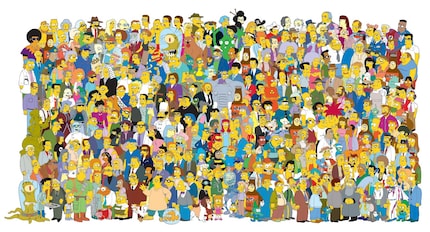
The "shorts"
Start out as a diver and become a millionaire? It's possible. I don't know if our funny characters actually did the diving before they invaded our screens, but one thing's for sure: it wasn't always all yellow for them. They too have had to fight to exist. The American television channel FOX and its producer James L. Brook were looking for 'shorts' to liven up the commercial breaks of the infamous Tracey Ullmann Show. These one-minute videos were supposed to make an artistic transition between the show and the commercials, and vice versa.
When his comic strip "Life in Hell" caught the eye of FOX producers in 1985, Matt Groening was just trying to make a name for himself in the business. Brooks asked him to provide sketches for his "shorts". Groening thought about using extracts from his comic strip before changing his mind. Sitting in the waiting room of the American channel, he realised that hosting 'Life in Hell' would have legal consequences for his life's work. So he pulled out all the stops, abandoned his initial project and created The Simpsons. His courageous decision was to take on phenomenal proportions.
The result was very simple, even for the conditions of the time. This is attributed to a misunderstanding: Groening left rudimentary sketches with the animation studio, thinking they would be improved before being animated, when the animators believed he didn't want them touched. Within three seasons, the 'shorts' had become so popular that FOX decided to make a series of them. That's how the Simpsons entered the big leagues.
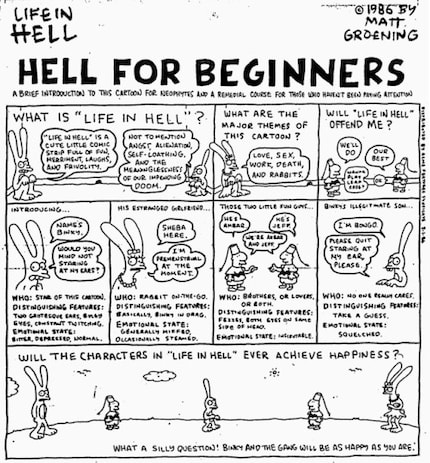
To create The Simpsons, Matt Groening based himself on his family. He named his characters after those closest to him, except Bart, whom he created after his brother Mark while giving him the anagram of the English word "brat" ("dirty kid") as his first name. Incidentally, we never found out how many members of his family ended up in The Simpsons.
Did he simply fall back on them for lack of time or inspiration? Quite the opposite. Since he wanted to show his idea of a dysfunctional family, he almost felt forced to choose them.
The perfect dysfunctional family
Allow me to make a foray into the field of psychology. Yes, yes, you read that correctly. As a die-hard Simpsons fan, you'll know that pretty much every line of dialogue and every episode has been written with a specific purpose in mind. Whether political, social or moral, every aspect of the human psyche is analysed, criticised and even corrected.
A dysfunctional family is characterised by deep conflict and unhealthy behaviour. Children are neglected, or even abused. While parents are often the source of conflict, this is often then adapted by the children. They grow up thinking that such behaviour is normal. These families are often the result of a couple in which one partner shows aggression, while the other encourages or allows it. Such behaviour is often evidence of addiction - alcoholism or drug addiction - as well as psychological disorders.
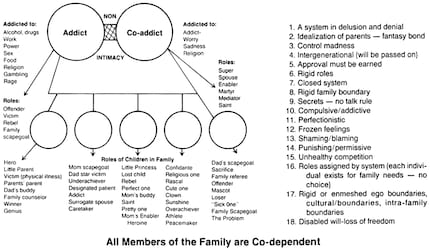
The parallels between this model and Matt Groening's family - or The Simpsons - are easy to identify. The addict here is the father, Homer Simpson. There are few episodes that don't highlight his alcoholism. Without him (and perhaps Barney Grumble too), Moe could close his bar right now. His bulimia is even more prominent. His figure is unmistakable. And his anger towards Bart - whom he regularly strangles - is just as explicit. Addictions to gambling, drugs and sex are also touched on, without taking such a prominent place.
The "co-addict" here is his wife, Marge. A model mother with a heart of gold, she wants the best for her children and husband. She pretends not to see injustices or tries to conceal them in order to maintain a perfect family image. Her "addictive behaviour" is expressed through worry, sadness and devotion.
.
The children's roles are also fairly clearly defined: Bart is his father's best friend while also falling victim to his angry outbursts. The labels "rebel", "slacker", "prankster", "problem child" and "rascal" apply here. Lisa is the heroine, the perfect child, the Simpson's sunshine and pride. In fact, she will dethrone Donald Trump and become President of the United States in 2030. She is close to her mother and responsible. She's the glue that holds the family together. Magic is the little princess. Even if she never takes off her wrap and only communicates with sucking movements, her messages are clear. She's mum and dad's little darling, and the clown of the siblings. She is often forgotten, ignored and left to fend for herself, which has helped her mature faster than her little friends, despite her very young age.
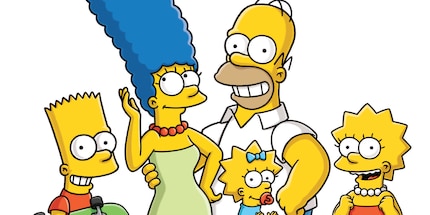
The whole town has a grain
The Simpsons are surrounded by equally dysfunctional characters. Their neighbours, the Flanders, are no less zany than they are. Ned, ultra-religious, drives Homer nuts every day with his "D'accodac!" and his "salit salut!". He never misses an opportunity to share his joy. He raises his children according to the Bible; he eats, drinks and says what he thinks God would eat, drink and say. Most Springfielders would even say that he IS the Bible. As well as his involvement with the volunteer fire brigade, he owns the Leftorium, a shop for left-handed people. Strangely, despite his old-fashioned clothes, thick moustache and "nerd" glasses, he is very muscular.

The family of Milhouse van Houten, Bart's best friend hopelessly in love with Lisa, is also very weird. The parents divorce, only to eventually reconcile. When Milhouse reveals that they are cousins, clichés about incest run riot. After the divorce, Milhouse's father Kirk sets out to win back his ex-wife, Luann, who is enjoying her new single life.
Nelson Mandela Muntz, the school dunce, also lives in a broken family: his father abandoned him and his mother when he was still young. Since then, his mother has tried to make ends meet by working as a prostitute. Beneath his exterior of a bully who loves beating up his mates, he has only one desire: to find a father figure.
The sofa, star of the series
Besides the dog Little Santa - in English "Santa's Little Helper" - and the cat Snowball V (or Snowball II), The Simpsons' sofa occupies an incomparable place in the series. Almost every episode begins in the same way: the camera zooms in from the famous Springfield skyline. The nuclear power station comes into view, followed by the school, where Bart writes a sentence several times on the blackboard as punishment. He then jumps on his skateboard and speeds home, while Homer finishes his day's work at the nuclear plant with a piece of irradiated metal in his shirt, Marge nearly loses Maggie at the supermarket and Lisa gets pulled out of her music lesson because of an impromptu solo. They all end up on the couch in front of the television.
The blackboard and sofa gags are cult elements of The Simpsons. Die-hard fans are immediately disappointed when an episode doesn't start with one of them. Rare are the opening credits of a series to have been so matter of debate (in German). Whether the sofa collapses under Homer's weight, the family wants to sit down and notices it's gone, or it gets electrified, when we talk about The Simpsons, we always think of that legendary sofa. Other series characters have also wandered into the Simpsons' home, sometimes even wallowing on their famous sofa.
And then there's the blackboard. Don't forget it, or you risk ending up like Bart, having to copy a sentence dozens of times over. These quotes, too, refer to current events, from Facebook to illegal downloads to film sequels. All these subjects found their way into them at one point or another in the series.
«It's Facebook, not Assbook. It's Facebook, not Assbook. It's Facebook, not Assbook.»
P.-S.: In the United States, having been parodied by The Simpsons is a real accolade. #fame
I can see dead people
With all the craziness The Simpsons comes up with on a daily basis, it's sometimes hard to see how close to reality certain viewpoints, predictions or situations come. One example (this is the most famous one, by the way)? The creators predicted that Lisa would one day replace Donald Trump as President of the United States. According to the producers, the series has always wanted to warn the American people by showing the aberrations of their culture. And Trump is one of them.

Barack Obama also found himself in an episode of The Simpsons, faced with a faulty electronic voting machine. In 2008, Homer wanted to vote for him, but the machine awarded his vote to his opponent. Four years later, a machine actually had to be replaced during the US elections, because the votes for Obama had been allocated to his opponent, Mitt Romney.
.
The Simpsons' insight doesn't stop at American presidents, either. Their crystal ball has also shown them diseases and construction work. For example, the 2004 Ebola epidemic, the worst since the virus was identified, was predicted in 1997. And the "Shard", a London skyscraper, found itself in an episode in 1995, even though its construction would not begin until 14 years later.
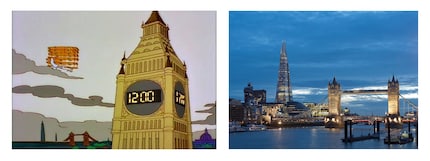
In a 1993 episode, the tiger Anastasia mauled her trainers, magicians Siegfried and Roy. Ten years later, Roy was actually attacked by a white tiger during a magic show. He survived, unlike his Simpsonian alter ego, although he was badly injured.
I'm sure these aren't really predictions. Rather, I think The Simpsons inspired the construction of buildings, the manufacture of faulty voting machines or even inspired some people to become president. After all, if it works in the Simpsons... And we still deny the influence of television on Americans!
Did you know?
- The Simpsons have had their own star on the Hollywood Walk of Fame since 2000.
- We owe the yellow colour of our favourite characters to colourist Gyorgyi Peluce. You can't zap them.
- The $847.63 Maggie costs at the supermarket checkout in the credits is what the average baby cost per month in 1989.
- Every time Bart pulls prank calls at Moe's bar, he dials 764-84377, numbers that correspond to the letters "SMITHERS."
- In the Arabic version of The Simpsons, Homer is called Omar Shamshoom. He drinks soft drinks instead of beer, and eats Egyptian beef sausages instead of hot dogs.
- The creation of an episode takes between six and eight months.
- Matt Groening himself produces the sucking sound Maggie makes with her pram.
- The surnames of several characters refer to streets in Portland, Oregon, Matt Groening's hometown.
- Actor Nancy Cartwright - a woman, that is - lends her voice to Bart.
- Maggie's stuffed rabbit is the main character in Matt Groening's "Life in Hell" comics.
- Only two Simpsons characters have five fingers on each hand: God and Jesus.
- In 1998, "Time Magazine" named Bart Simpson one of the most influential personalities of the century.
- Homer's theory that the universe is shaped like a doughnut is not completely far-fetched.
- So far, only Bruce Springsteen, Bob Dylan, Michael Caine, Tom Cruise, Clint Eastwood, Anthony Hopkins, Quentin Tarantino and Prince have refused to appear in The Simpsons.
- Marge appeared on the cover of Playboy in 2009.
- Homer's email address ChunkyLover53@aol.com, actually exists. If you write to him there, you'll even get a reply.
- So far, 837 characters have appeared in The Simpsons.
- The hexadecimal colour code that corresponds to Simpsons yellow is #FFD90F.
- The beer Homer often drinks is called Duff - which means "lame" or "dud".
- In 1990, The Simpsons released an album featuring the hit "Do The Bartman", co-produced by Michael Jackson.
A phenomenal series
Have we made much ado about nothing? Critics are predicting the imminent end of The Simpsons, whose ratings are dropping season by season. Yet this hasn't seemed to bother the people of Springfield so far, as the series' longevity in prime time has earned it a place in the Guinness Book of Records. In your face! The creators have been criticised for lacking creativity and repeating themselves. It's true that sometimes you get a feeling of déjà vu. But I've never noticed one scene copying another. Producers rework a story or try to reproduce a situation by changing the dialogue, the actions and the gags. More than one producer could line their pockets with this strategy.
The Simpsons are said to be crazy, artificial and the antithesis of the ideal family. Has-been, repetitive and boring. Nutty, yes, for sure. They'd give any psychiatrist a job. But show me a perfectly balanced family. People also say it's just a children's cartoon. No, really not. Or that they're just stupid. Are they? I've sometimes wondered why they have such an effect on us. I've found that no matter how juvenile some of the scenes may be, the series is always on point. Nothing is left to chance.
«The series is an extremely cynical and nasty settling of scores with the American way of life and the American dream. Many episodes are full of allusions and jabs at everyday Americans. Matt Groening spares no one - fitness gurus, religious fanatics, gun nuts, victims of overconsumption, TV addicts, fast-food addicts, followers of progress, petty bourgeois, radical feminists and other zealots of the same type.»
The 29th season is currently airing in the US. Its eleventh episode was seen by 8.04 million viewers, and that's just one example. A coincidence, you say? Read on. Those who believe that the series is of poor quality and no longer of interest to anyone clearly have no idea of the situation. The first episode attracted 27 million viewers. It's still mind-boggling!
Furthermore, as a brand new example shows, the creators are allegedly racist. True, but what kind of world do you live in if you think racism no longer exists? It's true that we shouldn't add another layer, but we shouldn't ignore it either. Besides, there's only one family that knows how to react like that: the Simpsons.

The Simpsons are suitable for all circumstances. You don't need to know them by heart to understand an episode. The characters entertain the little ones, while the dialogue and deeper messages make the grown-ups think. Some of the allusions make no sense at all, the scenes are sometimes completely far-fetched, and the result can seem random. And yet the lines, actions and images have more truth and depth than you might think. It's time you rethought the way you see the world, adding yellow as a dominant colour.
Everything I've described above makes The Simpsons special. They're crazy, singular and unique. There's no such thing as the perfect family, and we all see similarities to our own dysfunctional dynamics. If you think this doesn't apply to you, think again. You'll soon feel like you're in the middle of an episode. Reality distortion, lies, blackmail... that's The Simpsons too.
No one is forcing you to idealise them, watch them, or even know them. But you will miss out on one of the best TV shows in history. Yellow is the new black.
And above all, if you don't like them, you haven't understood them.

At Galaxus, there are three-eyed fish, crazy cat ladies and Spanish solo artists
I don't believe it but, according to the experts, the Simpsons are counting on you during this difficult time. They'd be fighting a supposed ratings slump by conducting outlier merchandise sales - exactly what happened in many episodes. The ultimate American dream. See? I hope this article has taught you something. D'oh!
Once The Simpsons turns 30 in its current form on 17 December 2019, you can resell these items for two or three times as much. Or keep them, as a true collector would. Ay, caramba...
When I'm not stuffing my face with sweets, you'll catch me running around in the gym hall. I’m a passionate floorball player and coach. On rainy days, I tinker with my homebuilt PCs, robots or other gadgets. Music is always my trusted companion. I also enjoy tackling hilly terrain on my road bike and criss-crossing the country on my cross-country skis.
From the latest iPhone to the return of 80s fashion. The editorial team will help you make sense of it all.
Show all